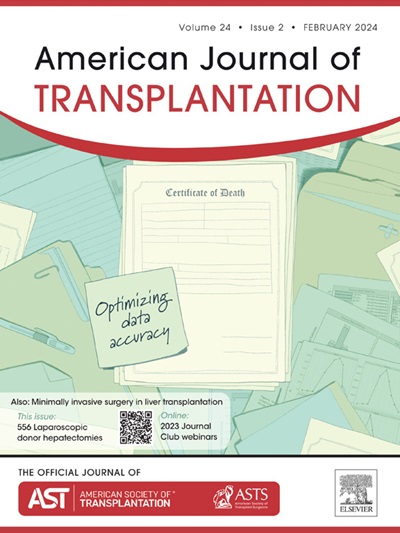A new principle to attenuate ischemia-reperfusion injury in kidney transplantation.
IF 8.2
2区 医学
Q1 SURGERY
引用次数: 0
Abstract
Ischemia-reperfusion injury in transplantation remains a significant clinical challenge with regard to both short-term and long-term complications. In this study, we developed a new amphiphilic construct, polyethylene glycol (PEG)-conjugated lipids (PEG-LIPIDs), to be administered ex vivo intra-arterially to procured porcine kidney allografts before reperfusion. The aim was to create a protective cell membrane barrier, preventing the recognition of ligands exposed on renal cells by plasma proteins and cells of the intravascular innate immune system. In vitro cell studies confirmed the safety of PEG-LIPID with no observed toxicity and demonstrated its efficacy in masking ligands on various cell types. The PEG-LIPID was evaluated in 3 porcine allogeneic transplant models: 1 acute dual en bloc nonsurvival transplant model (duration 6 hours) and 2 survival models with low and high ischemic stress, respectively (duration 96 hours). No immunosuppression was employed. Across all 3 porcine transplant models, PEG-LIPID consistently mitigated ischemia-reperfusion-induced thromboinflammation (complement, coagulation, and kallikrein/kinin activation) and long-term inflammation with a marked reduction in cytokine responses, including lower levels of interleukin 6. The PEG-LIPID-treated kidneys exhibited significantly improved allograft function, reflected in robustly lower creatinine levels. This translational study confirmed that the PIG-LIPID is a strong candidate drug to mitigate ischemia-reperfusion injury in clinical kidney transplantation.减轻肾移植缺血再灌注损伤的新原理。
移植缺血再灌注损伤在短期和长期并发症方面仍然是一个重大的临床挑战。在这项研究中,我们开发了一种新的两亲性结构,聚乙二醇(PEG)共轭脂质(PEG- lipids),在再灌注前在体外动脉内给药。目的是建立一个保护性细胞膜屏障,防止血浆蛋白和血管内先天免疫系统细胞识别暴露在肾细胞上的配体。体外细胞研究证实了peg -脂质的安全性,没有观察到毒性,并证明了其在多种细胞类型上屏蔽配体的功效。采用3种猪同种异体移植模型对peg -脂质进行了评价:1种急性双整体非存活移植模型(持续时间6小时)和2种低、高缺血应激存活模型(持续时间96小时)。未采用免疫抑制。在所有3种猪移植模型中,peg -脂质持续减轻缺血再灌注诱导的血栓炎症(补体、凝血和激肽激活)和长期炎症,细胞因子反应显著降低,包括白细胞介素6水平降低。peg -脂处理的肾脏显示出明显改善的同种异体移植功能,反映在较低的肌酐水平上。本转化研究证实了猪-脂质是减轻临床肾移植缺血再灌注损伤的有力候选药物。
本文章由计算机程序翻译,如有差异,请以英文原文为准。
求助全文
约1分钟内获得全文
求助全文
来源期刊
CiteScore
18.70
自引率
4.50%
发文量
346
审稿时长
26 days
期刊介绍:
The American Journal of Transplantation is a leading journal in the field of transplantation. It serves as a forum for debate and reassessment, an agent of change, and a major platform for promoting understanding, improving results, and advancing science. Published monthly, it provides an essential resource for researchers and clinicians worldwide.
The journal publishes original articles, case reports, invited reviews, letters to the editor, critical reviews, news features, consensus documents, and guidelines over 12 issues a year. It covers all major subject areas in transplantation, including thoracic (heart, lung), abdominal (kidney, liver, pancreas, islets), tissue and stem cell transplantation, organ and tissue donation and preservation, tissue injury, repair, inflammation, and aging, histocompatibility, drugs and pharmacology, graft survival, and prevention of graft dysfunction and failure. It also explores ethical and social issues in the field.

 求助内容:
求助内容: 应助结果提醒方式:
应助结果提醒方式:


